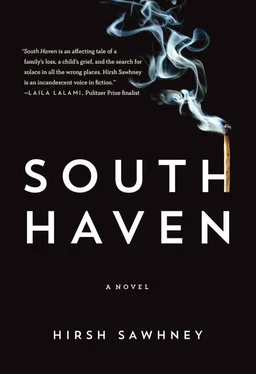She went out to the driveway via the kitchen door and returned a few minutes later with Mohan Lal, who kissed Siddharth on the forehead. He used the sleeve of his Michigan sweatshirt to soak up the saliva and turned to stare at his father, who was wearing a tweed jacket and his especially thick bifocals. This was the first time Mohan Lal had ever been inside Marc’s home, and Siddharth felt uneasy. This was his special place now, and he didn’t want to share it.
Ms. Farber placed a bowl of lentil soup in the microwave. “Boys, why don’t you keep watching somewhere else?”
“I thought TV was bad for you,” said Marc. “Should a kid who’s grounded really be watching so much television?”
“Scoot,” said Ms. Farber. “The adults have to look at some paperwork.”
Marc grabbed their dirty bowls and plunked them down in the sink. “What kind of paperwork?”
“My business plan.”
“Wait, you’re starting a business?” said Marc, walking toward the sofas at the far end of the room.
The microwave chimed, and Ms. Farber removed the soup. “Marc, why don’t we stop while we’re ahead?” She set the soup down in front of Mohan Lal, who was now on a barstool beside Siddharth.
Marc jumped onto the cushiony brown sofa and turned on Fox. “I mean, I thought a business had to, like, actually produce something. Last time I checked, psychologists don’t really make anything. They just talk. They talk and talk and talk until there’s nothing left in your head.”
Siddharth laughed, but he wished Marc wouldn’t give his mother any attitude in front Mohan Lal.
Ms. Farber slammed the dishwasher shut, rattling some plates inside. “Marc, it’s like your father’s sitting over there on the sofa. And trust me, I don’t mean that in a good way.” She walked over to a cardboard box below the kitchen window and started sifting through a stack of papers.
Mohan Lal spooned some soup into his mouth. “Mrs. Farber,” he said, “this soup is delicious.”
“Really?” She looked up at him over the rims of her reading glasses. “Wow, a compliment. I could get used to that.” She went back to her papers but then paused. “By the way, it’s Ms . Farber. But you need to start calling me Rachel.”
Mohan Lal swallowed more lentils in silence.
“Hey,” said Ms. Farber, “how about a glass of wine?”
Mohan Lal bit into a piece of bread. “Thank you, but I’ve been writing all weekend and now have to get to my grading.” The bread made his words hard to decipher, and Siddharth elbowed him in the thigh. He hated it when his father spoke with his mouth full. He noticed that Ms. Farber had placed her hand over her own mouth. Was she laughing at him?
“You sure?” she said. “I’ve got a lovely merlot.”
Mohan Lal turned to Siddharth. “Have you finished your homework, son?”
“Definitely.”
“Are you sure?”
“Of course I’m sure.”
Mohan Lal told Ms. Farber that he would have half a glass of wine.
Ms. Farber left her job at Deer Run in the first half of January. This turn of events was upsetting. Siddharth wondered what it would mean for him and Marc. But things kept going strong with this new friendship, and Ms. Farber continued the karate carpool. It was upon her suggestion that the four of them made plans to attend a regional martial arts tournament in Springfield, Massachusetts. Marc had been nominated to represent the dojo in a sparring competition for the thirteen-to-fourteen age group, and Ms. Farber arranged for Siddharth to participate in an exhibition forms demonstration.
He was looking forward to a day trip with his friend, and also to the possibility of winning a medal to hang around one of Arjun’s many baseball trophies. But as the Sunday of the tournament approached, he began to grow anxious, knowing that he might mess up in front of the other kids, that his father might do something embarrassing. He lay awake remembering the previous year’s PTA meeting. It seemed inevitable that Mohan Lal would do something odd again, would say some strange, incomprehensible thing to one of the referees or Ms. Farber.
The morning of the event, the Aroras pulled into Ms. Farber’s driveway just after ten. Marc was already outside in his big black parka, waiting beside a dumpster filled with debris from his mother’s renewed program of renovations. Ms. Farber came out five minutes later wearing black jeans, a purple coat, and a furry cake-shaped hat. She pulled a steel thermos out of a brown paper bag and poured out a Styrofoam cup of steamy hot chocolate for each of them.
It was a cloudy, windy morning with sporadic flurries. Mohan Lal drove especially slowly, which seemed to annoy Marc, who kept saying he would be glad to lend a hand at the wheel. Siddharth forced himself to laugh. He wondered why his father had to drive like such a fairy. As they headed north, his mind drifted to Arjun. He felt guilty for admitting it, but he was relieved that Christmas break was over and his brother was back at college.
Arjun had definitely changed at Michigan. He had grown a goatee, which Mohan Lal said made him look like a pinko. More importantly, since Arjun had been away, he seemed to have started caring more about his friends than his family. During his two-week stay in South Haven, he was always out with his high school friends, or talking on the phone with some mysterious person from college. Siddharth once asked if he was speaking to his girlfriend, and Arjun told him to shut up and mind his own business.
When Arjun wasn’t busy with his social life, he was reading a fat paperback about India called Midnight’s Children . Siddharth couldn’t fathom why his brother would want to waste his time on a book about such a dirty country. This novel was a constant source of tension between Arjun and Mohan Lal. Arjun said that it proved that Hindus and Muslims were actually similar and showed the true tyranny of Indira Gandhi. Mohan Lal called it a bunch of lies. He called its author a British puppet. He said that Arjun should forget about this foolish literature and focus on his grades. Arjun had gotten As in history and English but a C in calculus. He claimed that his math professor had something against immigrants, but Mohan Lal told him not to make excuses for his own errors and imperfections.
Seeking to impress his brother, Siddharth showed him a pile of math quizzes on which he’d gotten 98s and 100s. Arjun, who used to sit around predicting his classmates’ grades and future salaries, now said that grades were just numbers and what really mattered was if you were learning. Siddharth then brought him his book report on Call of the Wild . He was particularly proud of the cover he had drawn for it, which showed Buck on his haunches by a river. It was one of the greatest things he had ever created. He had used watercolors to render the dog’s eyes a light shade of blue, and he had painted some red bloodstains on the animal’s muzzle. He had also sketched the feathers of a dead Indian by Buck’s paws. He almost cried when Arjun criticized the picture.
Arjun said that Buck was a hero, but Siddharth’s drawing had him looking like a savage. After reading Siddharth’s actual essay, Arjun decided to reread Call of the Wild. He finished it in a single sitting and then declared that Siddharth’s thesis was simplistic. Siddharth had argued that the book was a story about undying animal instincts, but Arjun claimed it was a novel about subjugation. The dogs represented workers, or maybe slaves. They had to band together to overcome their oppressors. “And one more thing,” he said. “You should have mentioned the book’s failings. Look at the way it portrays women. And the way it portrays indigenous people — it’s just pathetic.”
Читать дальше












